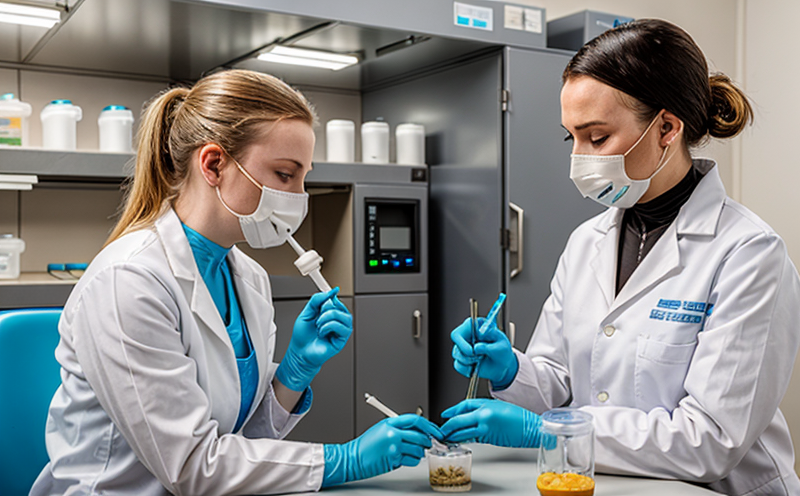EFSA Scientific Opinion on T-2/HT-2 Toxins
The European Food Safety Authority (EFSA) has published its scientific opinion regarding the risks associated with T-2 and HT-2 toxins, which are produced by fungi of the genus Fusarium. These mycotoxins present significant health concerns due to their potential to cause a range of toxic effects in humans and animals. This service focuses on providing comprehensive testing services aligned with EFSA’s recommendations, ensuring compliance with international standards such as ISO, EN, and ASTM.
The identification and quantification of T-2 and HT-2 toxins are critical for food safety and quality assurance programs. Our laboratory offers advanced analytical techniques that adhere to the latest EU guidelines, ensuring accurate detection and reliable data reporting. The presence of these mycotoxins can vary widely depending on environmental conditions, crop management practices, and geographical locations. Therefore, regular monitoring is essential to maintain product integrity and consumer safety.
Our approach begins with thorough sample preparation, which involves the extraction of mycotoxins from various matrices such as cereals, oilseeds, and feeds. This step ensures that all potential sources are accounted for in our testing process. Following extraction, samples undergo chromatographic analysis using highly sensitive mass spectrometry detectors to achieve precise quantification levels.
Compliance with EFSA’s scientific opinion is paramount for regulatory adherence. Our laboratory stays updated on the latest developments through continuous training and participation in proficiency testing programs organized by reputable bodies like AOAC International or BAPCO. This commitment ensures that our methodologies remain current and accurate, reflecting the most stringent requirements set forth by EFSA.
The importance of this service extends beyond just regulatory compliance; it plays a crucial role in safeguarding public health by preventing the introduction of harmful substances into the food chain. By adhering to these standards, we contribute significantly to maintaining consumer confidence and trust in food safety measures across Europe and internationally.
Our team leverages state-of-the-art equipment and experienced personnel who specialize in mycotoxin analysis. They possess extensive knowledge about the latest trends and best practices recommended by EFSA, enabling us to provide tailored solutions that meet specific client needs. Whether it's routine monitoring or emergency assessments during outbreaks, our expertise guarantees swift and reliable results.
For quality managers looking to implement robust control strategies, this service offers invaluable insights into managing risks associated with T-2 and HT-2 toxins. Compliance officers can use these findings as part of their broader risk management frameworks, ensuring that all necessary precautions are taken throughout the production process. R&D engineers benefit from detailed knowledge gained through our testing, which helps refine formulations and improve overall product safety.
Our laboratory’s proficiency in handling complex samples makes it an ideal partner for procurement teams seeking assurance regarding supplier reliability and adherence to international standards. With this service, they can make informed decisions based on verified data rather than assumptions or less precise methods.
Applied Standards
The European Food Safety Authority (EFSA) has established stringent guidelines for the detection of T-2 and HT-2 toxins in foodstuffs. These regulations are designed to protect public health by setting maximum acceptable limits (MRLs) for these mycotoxins across different commodities.
- ISO 13725: This international standard provides harmonized methods for the analysis of trichothecenes, including T-2 and HT-2 toxins. It outlines procedures for sample preparation, extraction, cleanup, and quantification using liquid chromatography with tandem mass spectrometry (LC/MS/MS).
- EN 15349: This European standard specifies the analytical methods applicable to the determination of deoxynivalenol (DON), another member of the trichothecene family, but its principles can be applied analogously for T-2 and HT-2 toxins.
- ASTM E1376: This American standard describes procedures for the isolation and identification of Fusarium species responsible for producing these mycotoxins. While not directly related to toxin quantification, it supports comprehensive testing by identifying the source organisms involved.
The harmonization provided by these standards ensures consistent results across laboratories worldwide, facilitating international trade in agricultural products without compromising on safety standards.
Competitive Advantage and Market Impact
Our laboratory’s ability to deliver reliable T-2 and HT-2 toxin testing services sets us apart from competitors. By aligning our practices with EFSA's scientific opinion, we provide clients with confidence that their products meet or exceed regulatory requirements.
The demand for precise mycotoxin analysis has grown significantly over recent years due to increased awareness of potential health risks linked to these contaminants. Our expertise in this area allows us to stay ahead of market trends and anticipate future needs. For instance, we have already begun incorporating emerging technologies like single-cell sequencing into our analytical protocols to enhance detection capabilities further.
Our commitment to excellence also extends beyond technical proficiency; it encompasses excellent customer service and rapid turnaround times for results. This ensures that businesses can integrate our services seamlessly into their operations without disrupting workflow schedules.
The impact of this service goes beyond individual clients; it contributes positively towards improving overall food safety standards globally. By ensuring compliance with EFSA's recommendations, we play a vital role in maintaining public trust and confidence in the integrity of the food supply chain.
Use Cases and Application Examples
- Regulatory Compliance: Ensuring that imported grains and feeds comply with EU MRLs for T-2 and HT-2 toxins.
- R&D Innovation: Investigating the impact of different agricultural practices on mycotoxin levels in crops grown locally or imported from other regions.
- Supply Chain Transparency: Providing verifiable data to suppliers about the quality and safety profile of their products, enhancing trust among all stakeholders involved in food production.
- Biosecurity Monitoring: Detecting early signs of contamination incidents at processing plants or storage facilities before they escalate into larger issues affecting broader segments of society.
- Patient Safety: Assisting healthcare providers in identifying sources contributing to adverse reactions observed among patients consuming certain types of contaminated food products.
- Public Health Surveillance: Supporting governments and public health organizations in tracking trends related to mycotoxin exposure within populations, helping inform policy decisions aimed at reducing associated health burdens.





